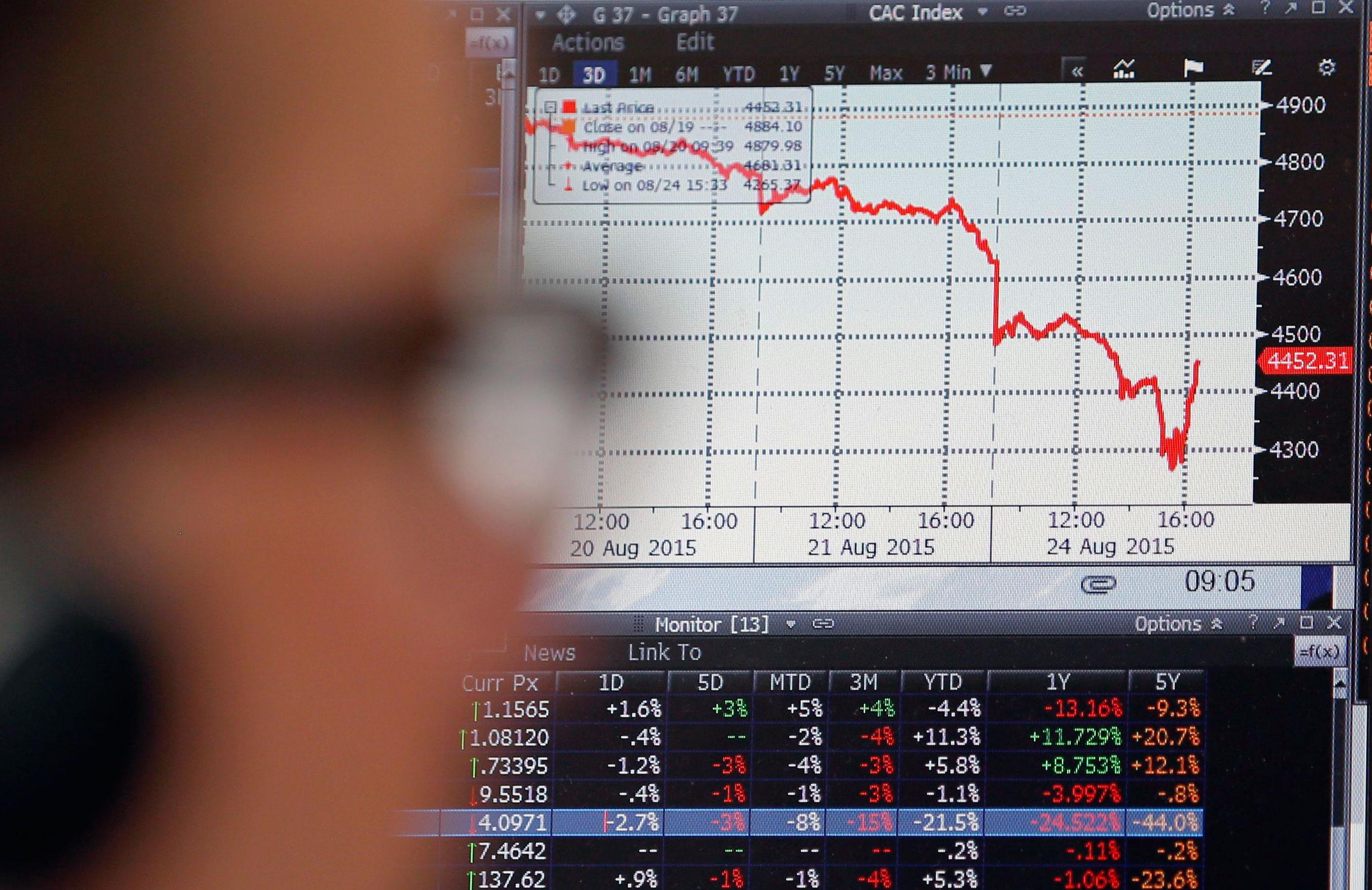Markets made a solid comeback from one-year lows as the benchmark BSE Sensex rebounded 291 points after the government said it's considering reconvening a special session of Parliament for passage of the stalled GST Bill.
The Bill could not go through in the last session due to a logjam in Parliament.
Brokers said sentiment got a lift after the government made its intention clear to reconvene the Monsoon Session to pass key reform bills, including Goods and Service Tax (GST).
The BSE Sensex started the session higher, hitting a high of 26,124.83, but fell victim to the selling pressure as China equities lost over 7 per cent.
Finally, it ended the day higher by 290.82 points, or 1.13 per cent, at 26,032.38.
In the previous three sessions, the index lost 2,190.08, including Monday's biggest-ever fall of 1.624.51 points.
The broad-based NSE Nifty too covered up some lost ground, up 71.70 points, or 0.92 per cent, to end the day at 7,880.70.
Intra-day, it moved between a high of 7,925.40 and a low of 7,667.25.
Value-buying in realty, metals and banking stocks gave the recovery a leg-up. Even short-covering by traders helped.
There was a turnaround in rupee's fortunes as well, which closed 55 paise higher at 66.10 a dollar, which contributed to the improved sentiment, brokers said.
Market volatility remained high in view of expiry of August derivatives contracts on Thursday.
"Markets went into the oversold zone which led to short covering, triggering today?s rise. Appreciation in the rupee and bounceback in global equities too added to the momentum," said Gaurav Jain, Director, Hem Securities.
Of the 30 Sensex stocks, 22 gained, with Vedanta staying on top. Tata Motors, Coal India and ICICI Bank advanced.
Except IT, all BSE sectoral indices added to the gains led by realty, banking, metal, oil and gas and PSU.
Mid-cap and small-cap indices got on to a positive trajectory, rising up to 1.99 per cent.
Most Asian markets closed mixed, with China's Shanghai Composite sliding 7.63 per cent. European equities were ruling higher in their opening trade.
Chinese analysts generally attributed yesterday's A-shares crash to investor disappointment with the People's Bank of China (PBC), the country's central bank, after it failed to announce an expected cut on the banks' reserve requirement ratio (RRR) over the weekend.
Chinese mainland stocks also took a severe hit from Wall Street, which suffered its steepest fall in nearly 4 years on Friday.
"Investors have been on high alert for signs of ebbing Chinese growth since the nation's central bank devalued the yuan earlier this month," UBS Wealth Management Global Chief Investment Officer Mark Haefele said.
"The disappointing economic numbers from China were made worse by a purchasing managers' survey from the US pointing to the weakest growth rate for manufacturing in nearly two years," state-run Global Times quoted him as saying.
Sun Wei, an associate prof at Peking University's School of Economics, said economic conditions in China and the US have largely determined how global financial markets perform.
"The US is expected to raise interest rates by the end of the year, while China is pushing forward with a series of financial reforms, such as the recent change to the yuan's daily official guidance rate against the greenback," Sun said.
"Given the importance of the two countries, any policy change from them may send shockwaves through the global financial markets," he said.
The current global financial turmoil is the aftermath of the 2008 crisis, said Xu Bin, professor of economics and finance at the China Europe International Business School.
"Developed countries used quantitative easing measures to deal with the financial crisis, leading to the global liquidity glut and massive capital inflows to emerging-market economies. As the US economy recovers, a rate hike is widely expected but the timing remains uncertain, causing global financial volatility," Xu told the Global Times.
Chinese stocks had another nightmarish day today amid continued slowdown in the world's second largest economy, prompting the central bank to cut the reserve requirement ratio and key interest rates to halt the slide that has devastated markets in India and other countries.
The benchmark Shanghai Composite Index fell 7.63 per cent to 2,964.97 points, following the 8.49-per cent loss in its worst daily slump since February 2007.
The Shenzhen Component Index lost 7.04 per cent to close at 10,197.94 points.
Nearly 2,000 shares fell by the 10-per cent daily limit, including even Sinopec and PetroChina -- two heavyweight shares that have long acted as a kind of market ballast, stabilising the market in times of crisis.
A further slide in the country's ailing stock markets prompted the People's Bank of China (PBOC), the central bank, to cut the reserve requirement ratio (RRR) and lower key interest rates.
From September 6, PBOC will cut the RRR for financial institutions by 50 basis points. The RRR for financial leasing companies and auto financing companies will be lowered by 300 basis points, the PBOC said in a statement.
Benchmark interest rates will also be cut. From tomorrow, interest rates for one-year lending and deposits will be cut by 25 basis points to 4.6 per cent and 1.75 per cent respectively, the announcement said.
The losing streak in China's markets came despite the government's decision on Sunday to allow pension funds to invest in the stock market to shore up investors' confidence and stabilising the market.
Under the new guidelines, up to 30 per cent of the pension fund's net assets can be invested in stocks and equities. The fund has assets of around 2 trillion yuan (USD 326.
8 billion) that could be invested, meaning up to 600 billion yuan (about USD 100 billion) could theoretically go into the stock markets.
"The scale of the funds is limited and they will enter the stock market gradually, so their short-term impact will be quite small," said Ren Zeping, an analyst with Guotai Junan Securities.
The Caixin flash China general manufacturing PMI, the earliest available indicator of manufacturing sector conditions in China, retreated to 47.1 in August, the lowest reading since March 2009.
"The continuous fall in the index in recent months indicates the economy is still bottoming out," said He Fan, chief economist at Caixin Insight Group.
Eighty per cent of China's stock market is comprised of small investors who operate independently without aid of fund managers like elsewhere in the world.
The volatility of the market which started in June diluted about USD four trillion worth of capital and forced about 20 million investors to leave the stock market after heavy losses.
Meanwhile, Foreign portfolio investors (FPIs) sold shares worth a net Rs 5275.40 crs yesterday,as per provisional data released by the stock exchanges.
Out of 30-index pack, 22 scrips ended in green, while rest finished in red.
Among the sectoral indices, realty zoomed by 6.78 per cent followed by metal 4.04 per cent, oil&gas 3.73 per cent, bankex 2.52 per cent, auto 2.06 per cent, healthcare 1.15 per cent and power 0.90 per cent. IT, however settled lower.
Mid-cap and Small-cap stocks too rebounded by 1.99 and 1.01 per cent, respectively.
Major index movers included VEDL powered by 7.73 per cent followed by Tata Motors 6.30 per cent, Coal India 5.23 per cent, ICICI Bank 5.06 per cent, Axis Bank 4.18 per cent, NTPC 3.92 per cent, Tata Steel 3.88 per cent, Gail 3.37 per cent, SBI 3.22 per cent, Reliance 2.89 per cent, BHEL 2.64 per cent, Dr Reddys 2.34 per cent, Hindalco 2.09 per cent and Cipla 2.02 per cent.
Key losers were HDFC slumped by 1.82 per cent, Maruti 1.20 per cent, Infosys 0.56 per cent, L&T 0.48 per cent, TCS 0.46 per cent, Wipro 0.40 per cent and Bharti Artl 0.20 per cent.
The market breadth remained shaky. About 1506 shares declined against 1214 shares advanced, while 108 unchanged.
The total turnover rose to Rs 4,804.66 crore, from Rs 4,386.38 crore yesterday.






